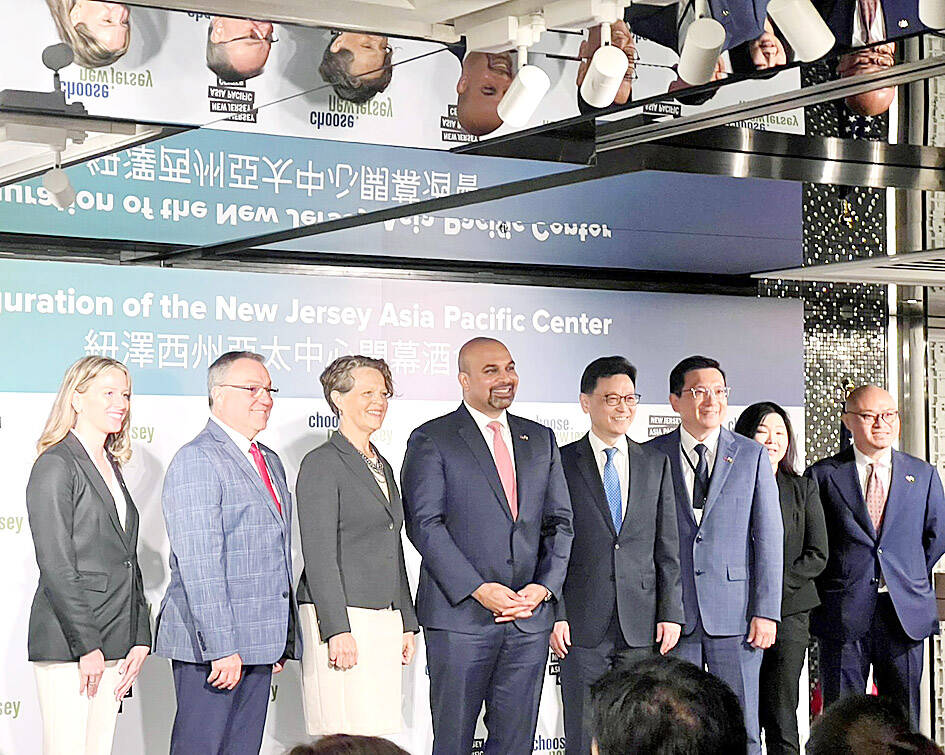The US state of New Jersey yesterday opened its Asia-Pacific center in Taiwan to expand its economic presence and cultural ties with regional partners.
In a prerecorded address played during an opening ceremony in Taipei, New Jersey Governor Phil Murphy said the New Jersey Asia Pacific Center’s opening has “unleashed new possibilities and prosperity for our workers and our families in New Jersey, in Taiwan, and across the Asia-Pacific region.”
“This pivotal step signifies the beginning of a new era, where our enduring bonds with Asian nations will evolve into unprecedented realms of opportunity, collaboration, economic prosperity and cultural enrichment,” he said.

Photo: CNA
Meanwhile, in a separate prerecorded video played at the same ceremony, Vice President Hsiao Bi-khim (蕭美琴) said that as a former resident of New Jersey, the Garden State has always had a special place in her heart.
Hsiao graduated from Montclair High School in Montclair, New Jersey.
“I am confident that the opening of the New Jersey Asia Pacific Center will provide strong momentum in boosting trade, investment and people-to-people ties between Taiwan and the Garden State,” Hsiao said. “More importantly, this will help deepen Taiwan-US economic and investment relations on the whole, making an already robust relationship even stronger.”
The New Jersey Asia Pacific Center is the fifth international office of Choose New Jersey, the state’s nonprofit business attraction organization.
New Jersey’s other international offices are in India, Israel, Germany (covering mainland Europe) and Ireland.
The New Jersey Asia Pacific Center is to serve Taiwan, Japan, South Korea and China, and is to be led by Sam Lin (林俞賢), who will manage a team of representatives, Murphy said.
More than 20 US states have now opened offices in Taiwan, the Ministry of Foreign Affairs said.

The Ministry of Foreign Affairs (MOFA) yesterday voiced dissatisfaction with the Comprehensive and Progressive Agreement for Trans- Pacific Partnership (CPTPP), whose latest meeting, concluded earlier the same day, appeared not to address the country’s application. In a statement, MOFA said the CPTPP commission had "once again failed to fairly process Taiwan’s application," attributing the inaction to the bloc’s "succumbing to political pressure," without elaborating. Taiwan submitted its CPTPP application under the name "Separate Customs Territory of Taiwan, Penghu, Kinmen and Matsu" on Sept. 22, 2021 -- less than a week after China

THE GOOD WORD: More than 100 colleges on both sides of the Pacific will work together to bring students to Taiwan so they can learn Mandarin where it is spoken A total of 102 universities from Taiwan and the US are collaborating in a push to promote Taiwan as the first-choice place to learn Mandarin, with seven Mandarin learning centers stood up in the US to train and support teachers, the Foundation for International Cooperation in Higher Education of Taiwan (FICHET) said. At the annual convention of the American Council on the Teaching of Foreign Languages held over the weekend in New Orleans, Louisiana, a Taiwan Pavilion was jointly run by 17 representative teams from the FICHET, the Overseas Community Affairs Council, the Steering Committee for the Test of Proficiency-Huayu, the

A home-style restaurant opened by a Taiwanese woman in Quezon City in Metro Manila has been featured in the first-ever Michelin Guide honoring exceptional restaurants in the Philippines. The restaurant, Fong Wei Wu (豐味屋), was one of 74 eateries to receive a “Michelin Selected” honor in the guide, while one restaurant received two Michelin stars, eight received one star and 25 were awarded a “Bib Gourmand.” The guide, which was limited to restaurants in Metro Manila and Cebu, was published on Oct. 30. In an interview, Feng Wei Wu’s owner and chef, Linda, said that as a restaurateur in her 60s, receiving an

MORE RETALIATION: China would adopt a long-term pressure strategy to prevent other countries or future prime ministers following in Sanae Takaichi’s steps, an academic said Taiwan should maintain communications with Japan, as Japanese Prime Minister Sanae Takaichi is to lead a revision of security documents, Taiwanese academics said yesterday. Tensions have risen between Japan and China over remarks by Takaichi earlier this month that the use of force against Taiwan would constitute a “survival-threatening situation” for Japan. Prospect Foundation president Lai I-chung (賴怡忠) yesterday said Takaichi’s stance regarding Taiwan is the same as past Japanese prime ministers, but her position is clearer than that of her predecessors Fumio Kishida and Shigeru Ishiba. Although Japan views a “Taiwan contingency” as a “survival-threatening situation,” which would allow its military to